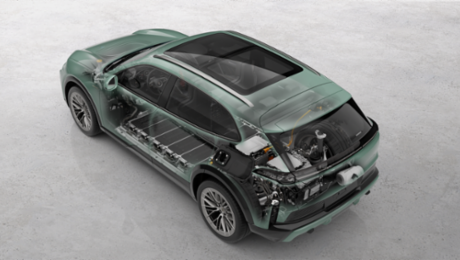The standard LED headlights in the Macan, Macan 4 and Macan 4S are divided into two light modules arranged one above the other. The upper modules contain the characteristic Porsche four-point daytime running lights. The daytime running light and indicator LED are arranged in alternating order in each of the four strip modules. The lower modules integrate the functional units for the low beam and high beam, including the associated assistance functions. In addition to the high beam assist, the standard LED main headlights also have speed-sensitive headlight control and dynamic range control.
The Macan Turbo is equipped with Matrix LED headlights as standard. This lighting system utilises speed, camera and navigation data to provide ideal illumination. A total of 84 LEDs per headlight generate the high beam together with upstream lenses and reflectors. The system can illuminate the road to a distance of more than 600 m.
A camera recognises vehicles in front and oncoming vehicles as well as reflective traffic signs. This information is used to distribute the high beam intelligently, as individual areas of the matrix can be specifically omitted. This enables optimal visibility with the high beam activated without disturbing other road users or being dazzled by traffic signs. The boost function additionally increases the illumination of the vehicle’s own lane in two-way traffic. This guides the driver’s eyes, thereby increasing comfort and safety. The technology also enables adaptive functions such as static cornering lighting and motorway high beam. The matrix LED headlights welcome and bid farewell to the Macan driver with a Coming Home/Leaving Home animation. In the Porsche Exclusive Manufaktur version, the headlights can be tinted on request and some are available in Glacier Ice Blue. They also include an exclusive animation with a ‘theatre’ effect. There are also further options for customisation in the rear: The LED tail lights with ‘Porsche’ lettering in Glacier Ice Blue or Black also offer a Coming Home/Leaving Home animation.
Driver assistance systems: more safety, more comfort
The new Macan offers a wide range of comfort and assistance systems. They make the car safer and make travelling and parking more convenient. The hazard display via the standard-equipment communication light is particularly impressive. It provides visual support for the Exit Warning and warnings from the Lane Change Assist function.
Overview of standard assistance systems and their functions:
|
Warning and brake assist system
|
|
Traffic Sign Recognition
Break recommendation and attention detection
eCall emergency call system |
|
Lane Keeping Assist system
Emergency stop function
|
|
Cruise control system Speed limiter Active Speed Limit Assist |
|
Lane Change Assist
|
|
Reversing camera
|
|
Park Assist
|
An optional adaptive cruise control system is available that takes the strain off the driver on long trips. This assistance system allows you to maintain a constant speed and distance from the vehicle in front. The latter function is possible right down to a standstill. Restart is semi-automated.
Porsche InnoDrive including Active Lane Keeping supports the driver with predictive longitudinal control and continuous steering interventions to maintain lane, speed and distances. Speed, acceleration, deceleration and cornering speeds adapt to the route and programmes. The system also reacts proactively to speed limits, bends, roundabouts, right-of-way rules and bottlenecks. The system links online navigation data and information from the vehicle’s cameras and sensors as well as available connected services. This transfers the route ahead and the traffic into a high-resolution real-time model. On well-developed country roads and motorways, the system takes over lane keeping in traffic jams with continual steering interventions – even in roadworks and bottlenecks. The system automatically detects lane markings and vehicles ahead in its own lane and the adjacent lane.
Assistance for parking and manoeuvring
The Surround View including Active Parking Assistance supports the driver in three ways when parking and manoeuvring. The driver can start the search for a parking space via the PCM. The system recognises parallel and perpendicular parking spaces using ultrasonic sensors. As soon as a suitable space has been found, the driver can start the automatic parking process via the PCM. The intelligent parking assistant takes over steering, accelerating and braking during this process and automatically manoeuvres the car into and out of parallel parking spaces.
The Surround View function uses four individual cameras to calculate a virtual top view of the Macan, which is displayed in real time in the PCM. The trailer manoeuvring assistant helps the driver when the car is being used as a towing vehicle and needs to be manoeuvred in reverse. After engaging reverse gear, all the driver has to do is activate the system and gently accelerate. The driver can use the PCM to set the angle at which they want to reverse the car. The image from the reversing camera on the PCM shows corresponding guiding lines for orientation. The system automatically turns the steering wheel and steers the trailer on the path selected by the driver.

